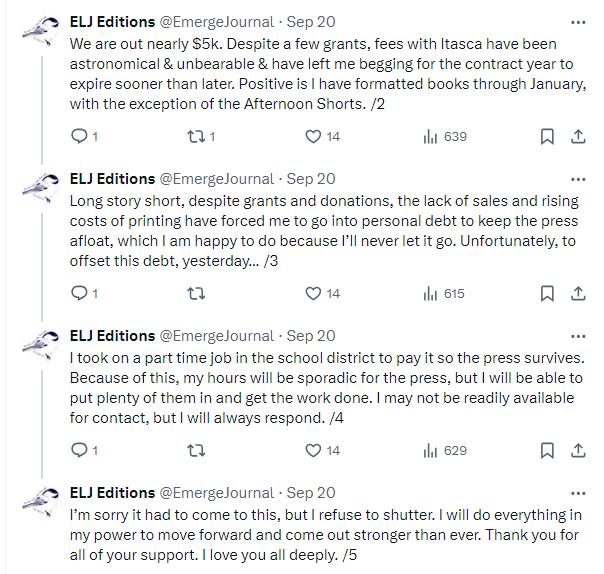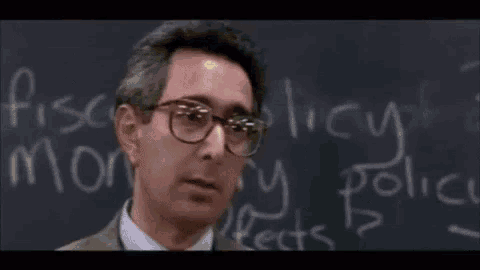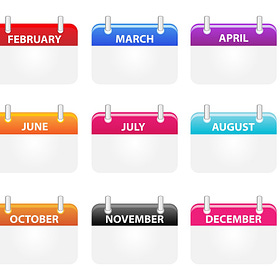Good Morning, Lit Mags, How Are You?!
"Scenes from the Literary Blacklist;" Former Guernica Editor interviewed; in praise of self-publishing; "The Worst Magazine in America;" publishing from prison; small press updates; and more
Welcome to our bi-weekly news roundup!
Greetings Lit Magpies,
Lots of think-pieces came out recently. Let’s dive in!
At
, former Crab Creek Review fiction editors Elizabeth Kaye Cook and Melanie Jennings wrote about a subject we’ve discussed many times here at Lit Mag News, namely, the retraction of published or accepted work once the work or its creator is deemed “problematic.”In “Scenes From The Literary Blacklist,” they write,
[T]oday’s culture of censorship and censure in literary magazines is stifling writers’ careers at their most vulnerable stage. Our experience at Crab Creek Review offers a case in point and a warning.
We knew from others in the lit mag community that our experience wasn’t uncommon. Eventually, we interviewed over a dozen writers whose work had been retracted for a variety of offenses—personal, political, perceived, and fabricated whole-cloth. Their editors, unable to countenance online outrage, alternately chose to A) rewrite the offending language, or B) “unpublish” the piece, with either minimal commentary or extravagant, self-flagellating apologies.
…Public censorship creates a culture of self-censorship. Today most editors simply choose—quietly—to avoid publishing controversial but high-quality work. If pressed, they might say, All writing is political. By now most writers in this sphere know where the boundaries are.
Over at Columbia Journalism Review, Josh Hersh has posted The power of uncomfortable ideas: Jina Moore Ngarambe on her time at Guernica. This recorded interview is “a conversation with Jina about what she learned from the experience, and why she believes so strongly in journalism’s responsibility to present uncomfortable perspectives.”
At the
Substack, Ross Barkan wonders whether writers should be spending so much time with literary magazines at all.What I am saying…is that if you are a writer who has not yet established yourself to the degree you’d like—you haven’t landed pieces in those dream publications, the famous ones people talk about—you should stop waiting around…Publications do not launch careers like they once did. The publicity machine has broken down, the old ladders have burned away, and social media, which became, in the 2010s, the mediator between reader and publication, cannot uplift the writer any longer. This is not cause for despair. It just means…writers must get smart about where they should be and what they should do. The operative word is do—just publish yourself.
At Current Affairs, Nathan J. Robinson argues for the outright closure of one particular magazine, The Atlantic. “In fact,” he writes, “in our print edition we recently awarded The Atlantic a prize for ‘Worst Magazine In America.’”
Robinson’s article is quite long and primarily focused on the magazine’s reporting (not its fiction or poetry). But, within the article there are some interesting tidbits relevant to all of us here. In particular, he discusses an article by George Packer, published in The Atlantic in 2021 and titled “The Four Americas.”
In this article, Packer criticized what he called the “Just America,” in which questions of identity have superseded questions of merit. Packer wrote,
Newspapers and magazines known for aspiring to reportorial objectivity shifted toward an activist model of journalism…Similar changes came to arts organizations, philanthropies, scientific institutions…In some niche areas, such as literary magazines and graduate schools of education, the idea of merit as separate from identity no longer exists.
In Robinson’s piece, condemning what he feels is The Atlantic’s history of shoddy journalism, he counters Packer’s claims:
First, what does he mean by “literary magazines”? That could mean anything from the New Yorker to the Iowa Review to Zoetrope: All-Story. Is he talking about literary magazines as a whole or just certain publications? And how does he think literary magazine editors select pieces? They literally just look to see if the writer checks certain identity boxes? They don’t have any other criteria? If this is hyperbole, then it’s false, and if it’s meant to be taken seriously, it needs proof.
Ultimately, Robinson argues, “[The Atlantic] is failing the basic job of a magazine, and we’d all be better off without it.”
Finally, in Breaking In: The challenges of making it in the publishing industry from prison, incarcerated journalist Lyle C. May has written about his experiences with the publishing industry. Some of what he’s written offers an interesting angle on our own previous discissions about editors who are overly fussy about submission guidelines.
Without access to a phone, typewriter, or any technology at the time, submitting writing to a publisher was a particularly daunting task and required investing a lot of time, energy, effort, and resources with no guarantee of a return.
…If an editor is so incurious about what comes through a designated submissions portal that they ignore an email that looks a little different, what chance does an incarcerated writer have of ever getting past this initial barrier?
Meanwhile, in the oceans of small presses, the waters are turbulent indeed.
In August Alan Squire Publishing posted a note that the press and magazine are going on hiatus.
As many of you know, indie publishing — actually, all publishing — is currently facing unprecedented challenges. We had already decided to seek a new distributor for ASP before the big distribution crisis of this past spring that left hundreds of indie presses without a means of getting their titles into the world. This, plus the significant losses we faced during COVID, mean that we need to take a step back and re-strategize.
Last week, ELJ Editions, which publishes Emerge Literary Journal, posted on X an update, which is both distressing and heartening:
For those of you looking for work in the fast-paced industry of lit mag publishing, here’s what’s out there:
After Dinner Conversation seeks volunteer readers. They’ve made an orientation video for anyone interested. Email Editor Kolby Granville at editor@afterdinnerconversation.com if you want to give it a go.
Sinister Wisdom seeks a Managing Editor (thanks to Erika Dreifus’s job listings for the link.)
Bicoastal Review seeks a Social Media/Communications Intern and volunteer readers.
And now, dear friends, it’s Bueller time. This is the section of the newsletter where we look at magazines that appear to be operational, might be open for submissions, but which have not been especially active on social media or responsive with work, leaving us all to wonder…
We only have one magazine this week:
Archetype. “[H]as gone non responsive. No summer issue and nothing on social for months.”
Becky’s note: Duotrope lists this magazine as “temp closed.”
Know of others? You can leave a comment here or contact me any time.
As for us, we’ve got our Lit Mag Reading Club chat tomorrow, in which we will discuss the fine work we read this month in Terrain.org. On Thursday we will be speaking to Editor Simmons Buntin. You can learn about all of this and register here.
ALSO! Our Lit Mag Reading Club roster is nearly complete! You can now take a look and see all the lit mags we will be reading up until the summer. I’m excited to speak to the editors at each of these magazines and share their insights with all of you. Learn all about the Lit Mag Reading Club and see the amazing line-up here:
And that you thinkers and deliberators, you coin-tossers and flip-floppers, you on the cusp of quite possibly deciding something momentous and you on the cliff of a mountain of possibilities, you with your brain azazz with zig-zagging zippers and you with your quadranted heart in a quarantine of questions, you with your tongue slips that reveal all those secret long-held answers and you watching for clouds that mimic all your unsurenesses, you who wish on stars that brighten your collisions with chaos and uncertainty and you standing right where the fork splits into a road, or the cross roads into a fork, or upon the knife-edge of something or other, you and you, in each and every place, pondering and reflecting, wondering and seeking, everywhere, every day, promising to promise and deciding to decide, all the while leaping into faith’s strong arms because really, what else is there, is the news in literary magazines.
Have a most beautiful week, pals.
Fondly,
Becky








The posts from the editor of ELJ Editions are both touching and inspiring. Brava to her! I sincerely hope that the editions survive.
Kudos to Lyle C. May for broaching the subject of incarcerated writers. Those we've published in the past contacted us by snail mail because email is not available to them. It requires extra work on the part of the editor(s), but can sometimes be very worth the trouble. In one anthology we did of "Outsiders" we pdf'd the hand-written submission and put it in the book like that because there was an element of art to it. Then came the "don't you know what this guy is IN for" email complaints. Another aspect of this sometimes fraught source of talent.
I don't think most editors would go through the bother. Here's where I would usually go off into one of my anti-elitist-sheltered-life-snob rants but I've been criticized for foul language so I'll just keep my fucking mouth shut.